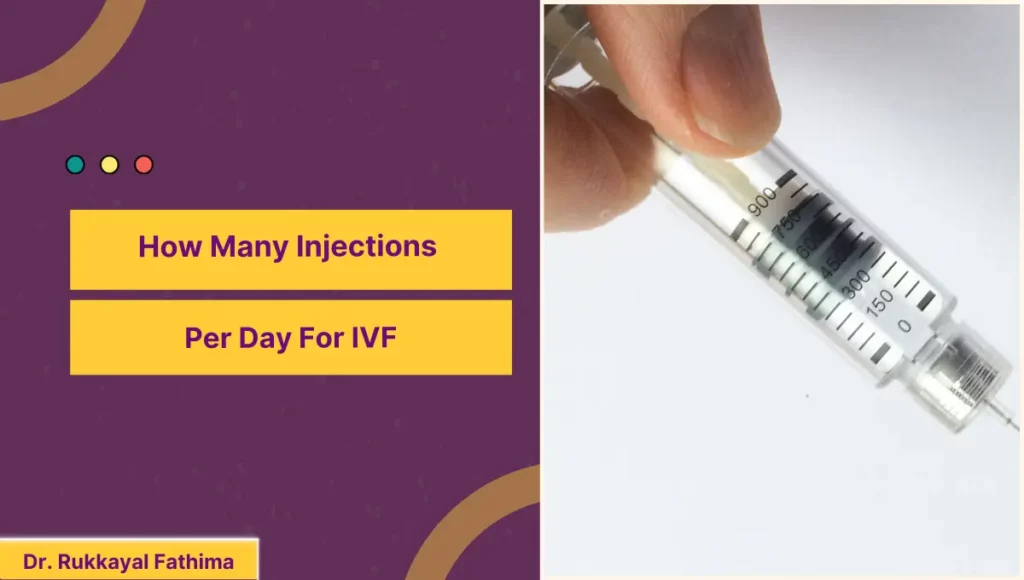IVF (In vitro fertilization) is a type of assisted reproductive technology where the woman’s eggs and the man’s sperm are collected and fertilized in a laboratory.
This method has helped millions of individuals and couples around the world become parents. If you have fertility issues and have decided to undergo IVF, you should know the procedures you have to undergo to successfully get pregnant.
IVF involves five steps: ovulation induction, egg & sperm retrieval, fertilization, embryo culture, and finally, embryo transfer. The first step, ovulation induction, is the procedure of administering hormonal injections to women to stimulate their ovaries to produce more mature eggs.
This step might be scary for some women as they have no idea how many injections they have to take and for how many days. This article will help you get a detailed account of the number of injections you will take during IVF.
How Many Injections Are Required for IVF?
On average, you might be required to take about 80–90 shots (injections) for about 8–14 days before your eggs are ready for retrieval. These injections are either taken subcutaneously (injected into the fat under the skin) or intramuscular (injected into the muscle).
The total number of injections you might have to take during ovulation stimulation is not fixed. The number differs for each woman depending on their fertility and health condition.
Women with minor fertility issues will be able to release more mature eggs with a minimum number of injections. In contrast, some women might need more doses to successfully release mature eggs for retrieval.
How Many Injections Per Day for IVF?
On average, you might be administered about 1 or 2 injections per day. This also depends upon your fertility and health condition. The way you react to the injections also plays a part in the number of injections you take in a day.
What Are the IVF Injections Used for Ovary Stimulation?
When you have decided to undergo IVF treatments, your fertility doctor will prescribe hormonal injections for you to take every day. These hormonal injections help stimulate the egg follicles to develop and release mature eggs. Below are the hormones that you will take during the procedure.
Gonadotropins
Gonadotropins facilitate follicle development and the growth of a mature egg. This is the hormone that facilitates ovulation every month.
Oestrogen
Oestrogen helps ready the endometrium and uterus for implantation and pregnancy.
Progesterone
Progesterone also helps with endometrial receptivity and prepares it for implantation.
What to Expect from IVF Injections?
Doctors recommend you take IVF injections to induce your ovaries to produce more mature eggs. These eggs can be retrieved later and used for fertilization.
Your body will naturally produce one or two mature eggs every month during ovulation. Pregnancy happens when sperm fertilizes the egg. Otherwise, the egg, along with the endometrial lining, will be expelled from the uterus during menstruation.
The IVF injections you take can stimulate the ovaries to produce multiple mature eggs at the same time, thus giving you a higher chance of having a successful pregnancy.
Are IVF Injections Painful?
This depends on the resistance level of each woman. While some might feel it painful, some might just feel a little discomfort due to the repeated injections they take every day.
How to Make IVF Injections Easier?
IVF injections are an integral part of the IVF process. There is no way you can bypass the procedure unless you produce high-quality eggs naturally. So, the best thing you can do is to learn how you can make the procedure easier. Here’s what you can do.
- Understand the IVF and ovulation stimulation procedure. Talk with your doctor or join communities and communicate with people who have similar experiences.
- Listen to what your doctor says and follow their instructions carefully.
- Place a heating pad or ice cube on the injection site to numb the pain.
- If you have a fear of injections, visit a professional for cognitive behavioral therapy (CBT) to overcome the fear.
What are the Side Effects of IVF Injections?
Though the IVF injections are safe and less painful, you might have some side effects due to the sudden hormonal changes in the body. Some symptoms include
- Stomach pain,
- Nausea,
- Bloating,
- Night sweats and hot flashes,
- Changes in the cervical mucus,
- Mood swings,
- Breast tenderness and
- Bruise or soreness in the injection site.
Conclusion
IVF is a good chance for several couples to have a baby of their own. IVF injections are only a part of the procedure that women can overcome easily if they take the necessary measures and precautions. These Injections are varied by IVF Injections before & After embryo transfer.
The support of family and friends is crucial during this period. All the pain and discomfort are worth it if you have the chance of having a baby at the end of the journey.
The duration for IVF injections differs for each woman based on their fertility and health condition. On average, a woman needs to take these injections for about 8–14 days.
No, IVF injections are generally not painful and can be self-administered every day. However, you might feel some discomfort or inflammation on the injection site and experience some side effects due to the hormonal changes in the body.
On average, you might need to take around 80–90 injections (1 or 2 per day) during the ovulation stimulation procedure. However, the number of injections varies from person to person based on their body condition and fertility.
The optimum follicle size for egg retrieval is around 15–22 mm in diameter. This is the stage when the egg will be mature enough to be fertilized with the sperm.
Your fertility doctor will monitor the growth of your follicles regularly and determine the right time for egg retrieval.





